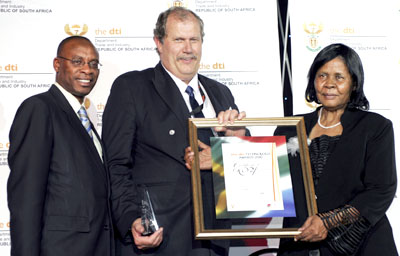Latest News Archive
Please select Category, Year, and then Month to display items
05 June 2018
Photo Supplied
 Archaeological excavations in the Wonderwerk Cave, north of Kuruman in the Northern Cape.
Archaeological excavations in the Wonderwerk Cave, north of Kuruman in the Northern Cape.
Research fellow Dr Lloyd Rossouw from the Department of Plant Sciences at the University of the Free State (UFS) recently published an article in the Nature Ecology and Evolution journal with Dr Michaela Ecker from the University of Toronto as lead author, and Dr James Brink, research fellow at the UFS Centre for Environmental Management. The findings described in “The palaeoecological context of the Oldowan-Acheulean in southern Africa” provides the first extensive paleoenvironmental sequence for the interior of southern Africa by applying a combination of methods for environmental reconstruction at Wonderwerk Cave, which have yielded multiple evidence of early human occupation dating back almost two million years ago.
Where water once was
The Wonderwerk Cave is found north of the Kuruman hills (situated in Northern Cape) a 140m long tube with a low ceiling. The surroundings are harsh. Semi-arid conditions allow for the survival of only hardy bushes, trees, and grasses. But during the Early Pleistocene, stepping out of the Wonderwerk Cave you would have been greeted by a completely different site, the researchers found. Using carbon and oxygen stable isotope analysis on the teeth of herbivores (Dr Ecker), fossil faunal abundance (Dr Brink), as well as the analysis of microscopic plant silica remains (phytoliths) excavated from fossil soils inside the cave (Dr Rossouw), the results show that ancient environments in the central interior of southern Africa were significantly wetter and housed a plant community unlike any other in the modern African savanna.
What difference does it make?
While East African research shows increasing aridity and the spread of summer-rainfall grasslands more than a million years ago, the results from this study indicate an interesting twist. During the same period, shifts in rainfall seasonality allowed for alternating summer and winter-rainfall grass occurrences coupled with prolonged wetlands, that remained major components of Early Pleistocene (more or less the period between one and two million years ago) environments in the central interior of southern Africa. That means our human ancestors were also living and evolving in environments other than the generally accepted open, arid grassland model.
UFS Chemistry wins dti award
2010-11-02
 |
|
At the awards ceremony are, from the left: Director-General of Trade and Industry Mr Tshediso Matona, Prof. Andreas Roodt and the Deputy-Minister of Trade and Industry, Ms Bongi Maria Ntuli.
Photo: S Osman
|
The research group of Prof. Andreas Roodt, Head of the Department of Chemistry at the University of the Free State (UFS) in Bloemfontein, won the first prize in the category Development of Small Medium and Micro-Enterprises (SMME) at the annual Department of Trade and Industry’s (dti) award ceremony.
Prof. Roodt received the prize for the high-technology project Development of novel nuclear pharmaceuticals in the Technology and Human Resources for Industry Programme (THRIP).
The Deputy-Minister of Trade and Industry Bongi Maria Ntuli, and Director-General Tshediso Matona presented the prize at the gala dinner held at Gallagher Estate, Gauteng in October 2010.
The dti’s Annual Technology Awards recognise excellence in research and aim to raise awareness on the benefits of using technology to improve the competitiveness of enterprises, within the local and global arena. Individuals and organisations are recognised for their efforts in advancing and promoting technology interests and emerging enterprises.
The technology awards cover the achievements of three of the dti technology programmes collectively, namely THRIP, managed by the National Research Foundation (NRF); the Support Programme for Industrial Innovation (SPII) managed by the Industrial Development Corporation (IDC); and the Small Enterprise Development Agency (seda) Technology Programme (stp).
Prof. Roodt, also vice-president of the European Crystallographic Association, who has just returned from a series of lectures abroad after being elected Fellow of the Royal Society of Chemistry in the UK, has received funding in excess of R3 million over the past two years to set up a specialised laboratory for synthesising active compounds. Key partners in this project are Dr Gerdus Kemp from PETLabs Pharmaceuticals in Pretoria; Prof. Connie Medlen (pharmacologist), recently appointed affiliate professor at UFS Chemistry; as well as Prof. Deon Visser from the Inorganic Chemistry research group at the UFS.
The research aims to produce new nuclear medicinal agents for the early diagnosis of cancer, heart and brain defects, and even HIV/ Aids.
Two doctoral students, Alice Brink and Marietjie Schutte, are currently actively involved in this project. They are the recipients of prestige scholarships introduced by the UFS Rector and Vice-Chancellor, Prof. Jonathan Jansen, under the UFS Research Initiative (the Advanced Biomolecular Systems Cluster) to complete their Ph.D. studies.
Media Release
Issued by: Lacea Loader
Director: Strategic Communication (actg)
Tel: 051 401 2584
Cell: 083 645 2454
E-mail: loaderl@ufs.ac.za
2 November 2010